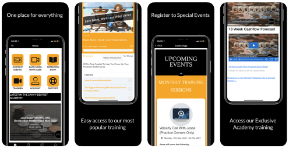What if you could get free media coverage?
Imagine your business being featured on a major television show, or in a feature article in a prominent publication.
The exposure would be fantastic. You’d look like a rock star.
Everyone would know who you are, and your business would sky-rocket.
It would be like winning the lottery.
Many small business owners dream like this, but few put their plans into action. And I confess that talking with Deb Morandin on the Savvy Dentist this week got me thinking.
I know we couldn’t cover everything in the podcast, so I did a little research. I found there are several mistakes that small business owners make in this area, and steps you can take if you want to increase your chances of getting your business media exposure.
Let’s take a look at what’s involved.
Major Media Mistakes Business Owners Make
Amanda Westphal is the founder of Prize Pig, a business that helps small businesses gain media exposure, and she shared a few common mistakes with us.
These are the top mistakes they see small business owners make:
- Writing a press release
Amanda says it’s better to cultivate a relationship with the journalist, rather than just pitching them.
- Sending out emails to a media list
Again, Amanda says to establish and nurture a relationship with a few journalists rather than sending out a shower of emails.
- Not being newsworthy
What’s news in your business isn’t necessarily of interest to the public. So be sure you have something newsworthy before approaching a journalist.
- Expecting instant results
Like anything in business, PR rarely leads to overnight success. So don’t expect immediate results and understand that you need to capitalise on any exposure.
- Asking questions
Tell them what you have and when you’re available, don’t ask what they want. You want to be the authority in your field.
So now you know the pitfalls, let’s look at the steps to achieve success.
Steps to Success for Appearing in the Media
If you want to get your business in the media, here’s what you need to do.
1. Know Your Target
Dennis Rutzou Public Relations say to start by preparing a media list. Establish where you want to be seen or heard. Do you want to be on television, radio, newspaper or online?
Select some specific shows or publications that would benefit your business and allow you to be seen by your target audience.
2. Do Your Research
Next, get to know and understand the media you’re targeting. Listen to the radio station, or watch the television program.
Familiarise yourself with the sort of stories they cover, and the names of key players. Doing this will give you a better chance of building a relationship with the journalist.
3. Create A Resource Page
Small Business Trends say to create a media resource page or a media pack that journalists can download. This should include your logo, professional images of business owners or partners, and basic facts about your business.
Make it easy for journalists to get hold of the relevant information. If they find it too hard to get these details, they’re likely to cut you out of the story.
So make it easy for the right people to find the information.
4. Build A Relationship
These days it’s easy to find people and start to create a relationship with them online. Journalists want to be found, so it’s easy to get hold of their Twitter handle or find them on Facebook.
Remember, this is not a one-way relationship – you need to do a little courting. Try following them online and share their stories, comment on their posts, or tag them online if it’s appropriate.
It’s a fine line between courting and stalking, so be strategic and considerate when you’re fostering the relationship.
Also, be sure to give a shout-out to any media mentions, just like this Canadian restaurant who were featured in a list of best restaurants.
5. Be Newsworthy
CANpr help small businesses with public relations, and they say,
“The most important thing to remember when you’re trying to get media coverage for your business is to make sure your story is actually newsworthy. The media are swamped with plenty of story ideas and will refuse to touch yours if it’s not!”
So if you have an idea for a story, what exactly makes it newsworthy? CANpr recommends checking that your idea is:
- Timely: It must be new or current. If it’s about something that happened last week, it’s too late
- Significant: The more people who are affected, the more newsworthy it is
- Local: This is where small business has an advantage because they’re often on top of local issues
- Prominent. You’re onto a winner if the people involved are prominent (think: celebrity)
- Emotive. Human interest stories are often highly emotional. Look at the story of the Bullied Buck-Toothed Kid Who Finally Gets His Perfect Smile.
Promote Your Mass Media
Here’s the secret that no one will tell you. Mass media is only the first step in an effective marketing strategy.
Mass media promotes your business and is great for credibility and awareness, but it rarely brings in revenue. Best-selling author Nick Nanton sees businesses invest a fortune in getting media exposure but then fail to follow through. Nick says,
“Get as much mass media as you can get, then promote your mass media appearances and content through direct media to your core audience of prospects and clients.”
He says that if you don’t promote your media appearances regularly, then your message is only heard once. And that gets you little to no return.
Media exposure can be a great tool in your marketing strategy, but it shouldn’t be the only one. So if you harness it, be sure to make the most of the publicity.
Get In The Media, Now
Getting your business in the media is not rocket science. It’s eminently doable.
You don’t need to sit around waiting for miraculous media exposure. You just need a clear plan and a little effort.
Start narrowing down your targets and doing a little research now, then create a media resource pack that people can download easily. Build relationships with relevant journalists online, and pretty soon an opportunity will present itself.
Play your cards right, and pretty soon you could be the next ‘overnight success’ you see on screen. Stop reading and start taking action – you’ve got this!




